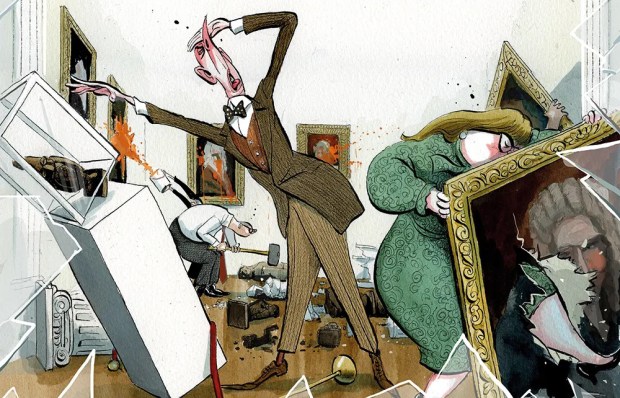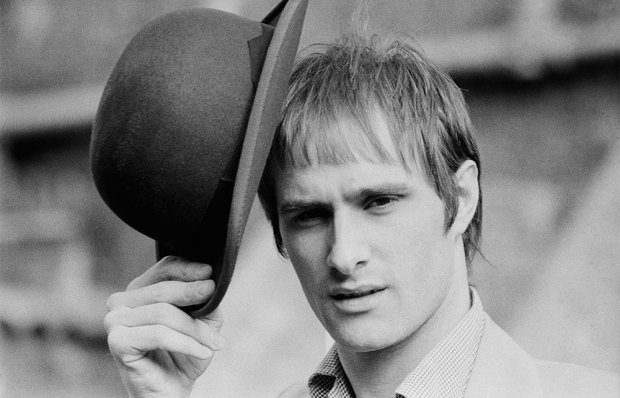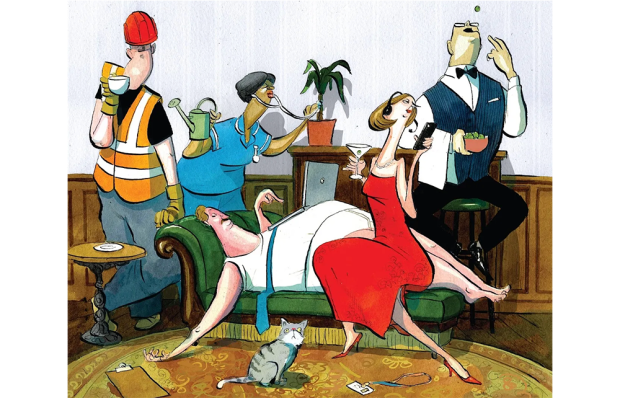We should talk about horizons, and the setting of desirable ones. A newspaper gave it a go the other day with the front-page news that it is possible pubs may reopen in April rather than May. Given that we read elsewhere that when pubs do reopen, they may not be allowed to serve alcohol, the thrill from this news was limited. This cannot be our best hope: that if everybody behaves themselves and everything goes according to plan then we might be allowed to drink an orange juice in public sometime after Easter. This horizon is not sufficiently motivating.
And societies, like the people within them, need motivation. There can’t be a person who hasn’t spent at least part of the past year feeling listless or even hopeless. Whether it’s elderly people cut off from relatives, younger people whose life-start keeps getting put on hold, or even middle-aged folk, a certain amount of glumness is forgivable.
Some results of this can already be seen. The British Medical Journal recently reported that experts are demanding ‘an urgent inquiry’ into why alcohol-related deaths hit record levels in the first nine months of 2020. If the government wants a fast turn-around on that inquiry, I would be happy to give it a go myself. If called upon, I would focus on the fact not just that booze is cheaper to drink at home than in the pub, or that there isn’t much else to do in the evenings. I’d focus on the fear that there isn’t an end to this, that this is what life is going to be like for the foreseeable future and that whatever comes next may be worse. None of these are unreasonable fears. All of them sit almost unaddressed.
At the beginning of Lockdown 1 we were told we needed to stay housebound for a number of weeks to ‘flatten the curve’. Then Lockdown 1 became Lockdown 2 and then the tier system and then another lockdown and at some point the suspicion started to grow that this might be lockdown life. Whenever news comes of a new virus strain, whether from Bristol or Brazil, that fear re-emerges. My own version is that at the end of this long, nearly endless tunnel is a Chinese reception committee. And so the drinks tray, or whatever your own vice happens to be, beckons with its false consolations.
What makes it worse is the fact that whenever an achievable horizon does appear, it is no sooner heralded than it recedes. For a long time the clearest horizon was the hope provided by a vaccine. The UK has indeed done a remarkable thing here. Even those among us most grudging about complimenting people in power have to concede this. Our government, healthcare professionals and volunteers have done something wonderful in recent weeks, something that should be a cause of legitimate pride.
Yet the people who have had the vaccine have had it and are now back in their houses. Nothing has changed. Jab two will be next, we are told — perhaps 12 weeks after the first. So there’s another quarter of a year gone just there, always with the fear of a new strain of the virus emerging. At present, if everything goes according to plan, the best-case scenario is that at some point before the summer our desolate townscapes will become revitalised again by the over-85s hitting the streets.
Perhaps I should state here that I have nothing against the over-85s. Many of the best people I know are over 85. But the notion that the octo- and nonagenarians are going to go out and kickstart the British economy for weeks single-handed strikes me as remote. Even with the promise that they will soon be followed up by the over-75s roaring on to the scene. If I were an owner of one of the few surviving restaurants I would prepare for this grand reopening by keeping the music low and printing a lot of larger menus.
Yet even this vision seems a long way off. And I suspect that we could all do with a better idea of what we have to look forward to. A few hopes have been dangled. In December the admirable Yale academic Nicholas Christakis made headlines around the world when he suggested that the era of the pandemic may be followed by a sex-fuelled ‘Roaring Twenties’ comparable to the 1920s. The media does not usually hang on the words of an academic even as distinguished as Professor Christakis. But they did so for an obvious reason, which is that his prediction held out a kind of hope. Though it’s not one that everyone will view as ideal. And even if they do, history suggests that the fruits of a great decade-long orgy would not be fairly and evenly distributed. A small number of people would accrue a lot of the benefits, a larger number wouldn’t get much of a look-in and a lot would just have even more cause for resentment.
And resentment is everywhere. It only lacks targets. Which is why when a celebrity like Amanda Holden is caught daring to visit her elderly parents, the whole damn thing comes down on her. The same mood can be spied in that majority of the British public who last week told pollsters that the new ten-year prison sentence for sneaking around the quarantine regulations is either just about right or not severe enough. Perhaps people do feel especially strongly about people creeping back to the UK via Dublin. But I can’t help thinking that the legislation has only come about because people are fed up and get some slight relief from the prospect of others being in the stocks.
These are unhealthy feelings, and a society and its government should work on developing better ones. Somewhere we have got to start focusing on what life could be like on the other side of this. Personally, all I know is that I want us to boom. Not just to stagger through, but to absolutely boom. This country has plenty of world-class businesspeople who can advise on how to make that happen, and I for one would like to start hearing it. Easier said than done, I hear you say. Yes, but saying it is a start.
Got something to add? Join the discussion and comment below.
Get 10 issues for just $10
Subscribe to The Spectator Australia today for the next 10 magazine issues, plus full online access, for just $10.
You might disagree with half of it, but you’ll enjoy reading all of it. Try your first month for free, then just $2 a week for the remainder of your first year.















Comments
Don't miss out
Join the conversation with other Spectator Australia readers. Subscribe to leave a comment.
SUBSCRIBEAlready a subscriber? Log in